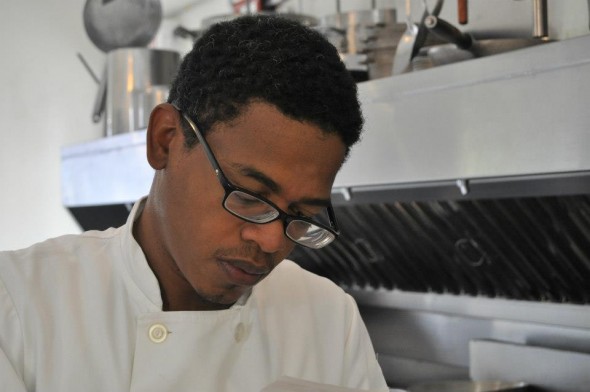If you travel a lot for work or family, it can become second nature to complain about feeling tired and drained of energy, frustrated by the many pitfalls one may encounter through the use of trains, planes and automobiles, to say nothing of the quality of food you're likely to encounter at most public transit centers. Ismail's story reminds us that travel is something that can be taken for granted. And that visiting a new place, one that may be close by but oh-so-different from what you're used to, can open your eyes up to a dozen different journeys, personal and professional.
When did you know that you wanted to work in food?
As you can imagine, there are many factors that contribute to my love for food, and I'd be doing my mother and many other influences a disservice not to mention them. But when I moved to Putney, Vermont, that passion was paired with a food culture that was so aware of not only food but the food system as a whole. These convergences led to a true emotional attachment to food that I intend to not only continue to nurture, but share with as many people as possible, especially those from urban settings.
How did you get your current good food job?
Because I currently own a "good food" company and work for a "good food" job, I'll answer for both.
The Gleanery was started based off of personal relationships with farmers, and a community of people committed to securing the community supported restaurant model. We came together and opened The Gleanery by selling memberships to the restaurant, a successful kickstarter campaign, food, labor and pottery for trade and our own financial and sweat equity.
As for Daily Table, a friend of mine came across the posting on craigslist and forwarded it to me. Within a day, I contacted The Executive Director and fervently shared my interest in joining their opening team and delivering on their mission.
How did your previous work or life experience prepare you for a good food job?
Aside from a 3 year stint estimating tributary habitat, I have always been surrounded by food in one way or another. I've managed to stay current through constant experimentation, reading and relationship building.
What was the greatest obstacle you had to overcome in pursuing your Good Food Job dream?
I guess it would have to be lack of capital. My partners and I knew we wanted to open The Gleanery, but were severely shy of the necessary funds to launch, and we were shaking in our boots! It is amazing what can be accomplished when you share your ideas with others that are just as passionate as you are. We didn't call it quits. We dug deep. We put together our business plan and believed that a restaurant that would focus on the use of what the farmers needed us to take instead of what we preferred was not only what we wanted, but what could eventually be a model that could be replicated. We were encouraged by the farmers, artists and community members that believed in us and our concept.
What can you identify as the greatest opportunities in food right now?
I think the greatest opportunities exist around food surplus issues. Be it finding uses for excess, efforts in food recovery, or prevention through encouraging less production, it would be nice to see more models developed to implement strategies of use before it goes to compost.
If you could be compensated for your work with something other than money, what would it be?
Having never left the States (except for one trip to Ottawa), I'd love to be compensated with the opportunity of traveling to other places and experience other cultures. I can only imagine the effect it would have on me given the impact that the move from Cleveland to Vermont has had.









